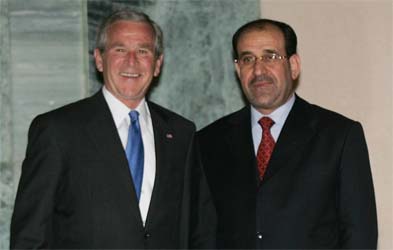The US has killed Zarqawi. What does it mean? From the Independent:
US forces in Iraq said the killing was a major victory.
“We killed him, and it’s always great when you can remove someone that has caused this much harm,” said Maj. Frank Garcia, public affairs officer for the 2nd Brigade Combat Team, 101st Airborne Division. “We’re one step closer to providing stability to the region.”
Or maybe not that major and not that much closer—from the Guardian:
“Whether it makes much difference to the overall level of violence is dubious, because he was responsible only for a small amount of the terrorist attacks,” Lord Garden, a former assistant chief of defence staff, said.
Returning to the story in the Independent, we find that a student in Baghdad is hopeful …
Thamir Abdulhussein, a college student in Baghdad, said he hopes the killing of al-Zarqawi will promote reconciliation between Iraq’s fractured ethnic and sectarian groups.
“If it’s true al-Zarqawi was killed, that will be a big happiness for all the Iraqis,” he said. “He was behind all the killings of Sunni and Shiites. Iraqis should now move toward reconciliation. They should stop the violence.”
… while an older resident of the capital says Zarqawi’s death means little:
Amir Muhammed Ali, a 45-year-old stockbroker in Baghdad, was skeptical that al-Zarqawi’s death would end the unrelenting violence in the country, saying he was a foreigner but the Iraqi resistance to US-led forces would likely continue.
“He didn’t represent the resistance, someone will replace him and the operations will go on,” he said.
As one commentator put it: “The hydra loses a head.”
The notion that history is playing one of its awful, bloody, pointless pranks can hardly be avoided—again, from the Guardian:
Experts said intelligence about Zarqawi’s movements had improved over the past year as frictions between foreign fighters and domestic militants grew.
Rosemary Hollis, the director of research at Chatham House, said Iraqi militants were becoming fed up with Zarqawi and foreign insurgents operating in their country.
“They were increasingly against Zarqawi because he set Arabs against Arabs. He was both fanatical and a foreigner,” she said. “Iraqis believe he was a pursuing a case against their own and perhaps, in the fullness of time, would have dealt with him.”
Somewhere in Iraq another hydra head smirks and says: “Thanks, Uncle Sam! I couldn’t have done it better myself.”
Update 2006.06.09: Patrick Cockburn on how Zarqawi was, in effect, a US creation and the purposes he served as such:
Zarqawi owed his rise to the US in two ways. His name was unknown until he was denounced on 5 February 2003 by Colin Powell, who was the US Secretary of State, before the UN Security Council as the link between Saddam Hussein and al-Qa’ida. There turned out to be no evidence for this connection and Zarqawi did not at this time belong to al-Qa’ida. But Mr Powell’s denunciation made him a symbol of resistance to the US across the Muslim world. It also fitted with Washington’s political agenda that attacking Iraq was part of the war on terror.
The invasion gave Zarqawi a further boost. Within months of the overthrow of Saddam Hussein the whole five-million-strong Sunni Arab community in Iraq appeared united in opposition to the occupation. …
The next critical moment in Zarqawi’s career was the capture of Saddam Hussein on 15 December 2003. Previously US military and civilian spokesmen had blamed everything on the former Iraqi leader.
No sooner was Saddam captured than the US spokesmen began to mention Zarqawi’s name in every sentence. “If the weather is bad they will blame it on Zarqawi,” an Iraqi journalist once said to me. It emerged earlier this year that the US emphasis on Zarqawi as the prime leader of the Iraqi resistance was part of a carefully calculated propaganda programme. A dubious letter from Zarqawi was conveniently discovered. One internal briefing document quoted by The Washington Post records Brigadier General Kimmitt, the chief US military spokesman at the time, as saying: “The Zarqawi psy-op programme is the most successful information campaign to date.” The US campaign was largely geared towards the American public and above all the American voter. It was geared to proving that the invasion of Iraq was a reasonable response to the 9/11 attacks. This meant it was necessary to show al-Qa’ida was strong in Iraq and play down the fact that this had only happened after the invasion.
Two years ago, Fred Kaplan was shocked at how the administration found Zarqawi useful:
Apparently, Bush had three opportunities, long before the war, to destroy a terrorist camp in northern Iraq run by Abu Musab Zarqawi, the al-Qaida associate who recently cut off the head of Nicholas Berg. But the White House decided not to carry out the attack because, as the [NBC News] story puts it:
“[T]he administration feared [that] destroying the terrorist camp in Iraq could undercut its case for war against Saddam.”
The implications of this are more shocking, in their way, than the news from Abu Ghraib. Bush promoted the invasion of Iraq as a vital battle in the war on terrorism, a continuation of our response to 9/11. Here was a chance to wipe out a high-ranking terrorist. And Bush didn’t take advantage of it because doing so might also wipe out a rationale for invasion.
The question is: who will be the next object of our Two Minutes Hate?



